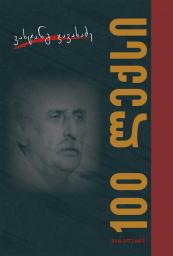100 POEMS
‘When Vakhtang Javakhadze first published his poems, his readers had the impression he was a mature writer, as if his mastery was effortless, achieved without toil or exertion. His style was instantly recognizable because he would spin his lyrical imagery around an unexpected poetic idea, the coil being complex and easy, thoughtful and alert at the same time.’
D. Tserediani, poet, translator
‘Vakhtang Javakhadze is one of those writers who defines the level not just of poetry, but of modern literature. If we make an effort, we want to become participants in a European poetic process and we say that for this we have sufficient strength, Among those who make this evaluation is Vakhtang Javakhadze. He is an eternal seeker, and that is why his work’s depth and novelty always seizes our attention.’
R. Chkheidze, author, literary critic
EXTRACT
Translated into English by Donald Rayfield
TO THE TRANSLATORS OF MY POEM
Dear sponsor, if you wish, change the rhythm.
If you wish, change the metre too, twice or thrice.
If you wish, simplify the complex rhymes, too.
Don’t avoid alliteration, either.
If you need to, break off the line at the beginning,
Decode the metaphor, too, it doesn’t matter, it can take it.
Don’t imitate syntactical similarities and matches,
Take a free comparative view of comparisons,
Don’t keep count of subtexts and abbreviation signs,
Don’t preserve every example of inversion.
Don’t search for appropriate slang and epithets,
Avoid reproducing the exact intonation.
Don’t pursue the accent or the pauses,
You may refrain from emphasizing some refrains.
You may occasionally sacrifice a hyperbole,
There’s no need for every subtitle.
Leave out, when you come across them, exact adjectives,
Leave out a stanza and leave out a line.
Leave them out forty times, leave them out sixty times…
But don’t omit my name and surname!
In case of using the information, please, indicate the source.
